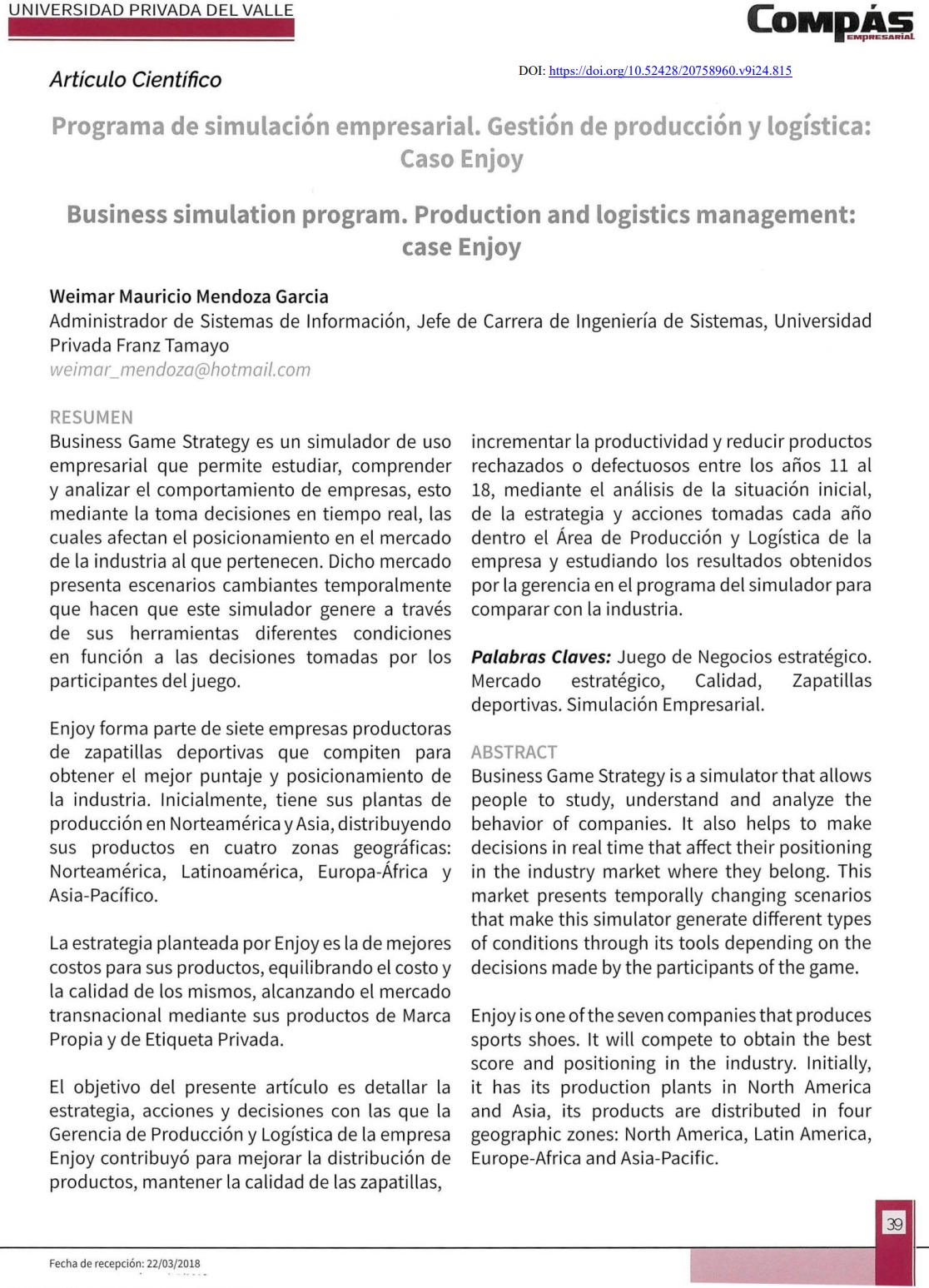Business Simulation Program. Production and Logistics Management: Case Enjoy
DOI:
https://doi.org/10.52428/20758960.v9i24.815Keywords:
Business Game, Strategic Market, Quality, Sports Footwear, Bussines SimulationAbstract
Business Game Strategy is a simulator that allows people to study, understand and analyze the behavior of companies. lt also helps to make decisions in real time that affect their positioningzin the industry market where they belong. This market presents temporally changing scenarios that make this simulator generate different types of conditions through its tools depending on the decisions made by the participants of the game. Enjoy is one of the seven companies that produces sports shoes. lt will compete to obtain the best score and positioning in the industry. lnitially, it has its production plants in North America and Asia, its products are distributed in four geographic zones: North America, Latin America, Europe-Africa and Asia-Pacific. The strategy proposed by the company Enjoy has the best costs for their products. lt balances its costs and quality. That is why it can reach transnational market through its own brand products and private label. The objective of this article is detail the strategy, actions and decisions with which the Production and Logistics management of the company Enjoy contributed to improve the product distribution, maintain the quality of the shoes, increase productivity and reduce products that were rejected or defective from years 11 to 18, through the analysis of the initial situation, the strategy and actions taken each year in the area of Production and Logistics of the company and studying the results obtained from the decisions taken by management in the simulator program to compare with the industry.
Downloads
References
(1) Thompson, Jr., Stappenbeck, G. J. y Reidenbach, M. A. (2009). Guía del Jugador The Business Strategy Game. Ed. Española, Mc.Graw Hill lnteramericana
(2) Hernández, R., Fernández, C. y Baptista, P. (2006). Metodología de la Investigación. (4ta Ed.) México D.F., México: Me. Graw Hill/ lnteramericana Editores. S.A.
(3) Vara, A. (2015). Siete pasos para elaborar una tesis. (4ta Ed.) Lima, Perú: Editorial Macro
(4) Rodríguez, G. (1984). Metodología de la Investigación Cuantitativa. España: Editorial Aljibe.
(5) Thomson A., Peteraf M., Gamble J. (2012). Administración Estratégica, Teoría y casos. (lSva Ed.) México: Me GrawHill

Downloads
Published
How to Cite
Issue
Section
License
Copyright (c) 2018 Weimar Mauricio Mendoza García

This work is licensed under a Creative Commons Attribution 4.0 International License.
Authors who publish with this journal agree to the following terms:
- Authors retain copyright and grant the journal right of first publication with the work simultaneously licensed under a Creative Commons Attribution License 4.0 that allows others to share the work with an acknowledgement of the work's authorship and initial publication in this journal.
- Authors are able to enter into separate, additional contractual arrangements for the non-exclusive distribution of the journal's published version of the work (e.g., post it to an institutional repository or publish it in a book), with an acknowledgement of its initial publication in this journal.
- Authors are permitted and encouraged to post their work online (e.g., in institutional repositories or on their website) prior to and during the submission process, as it can lead to productive exchanges, as well as earlier and greater citation of published work.









